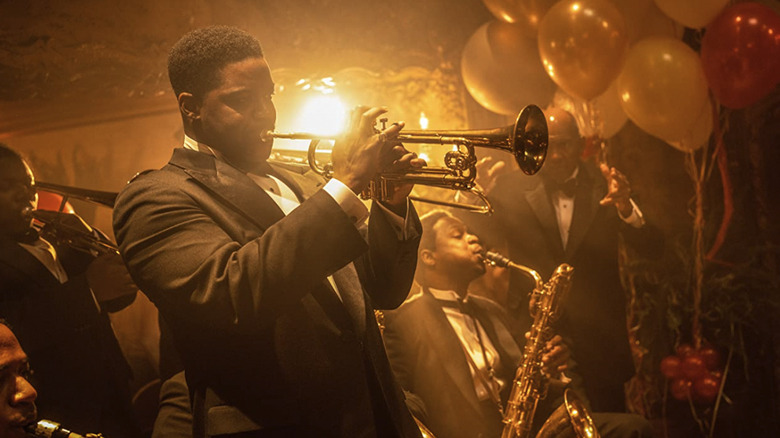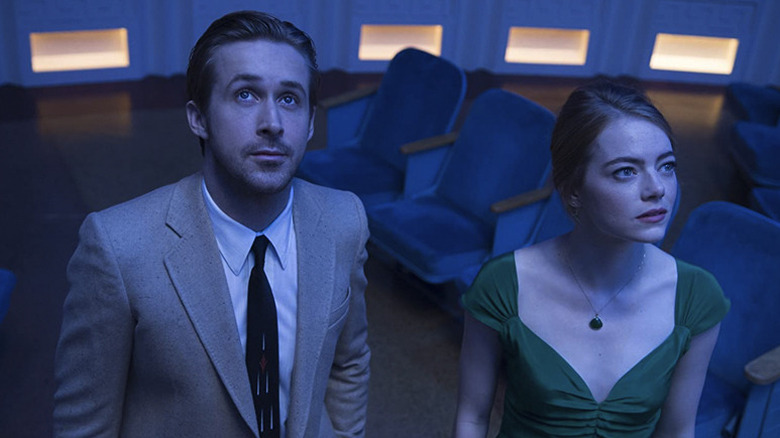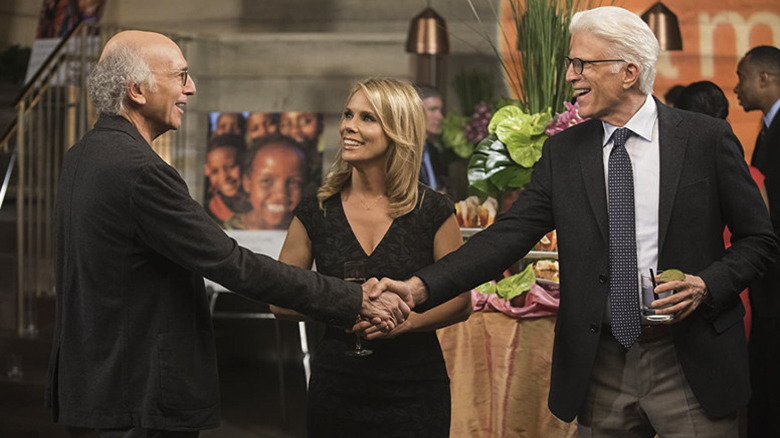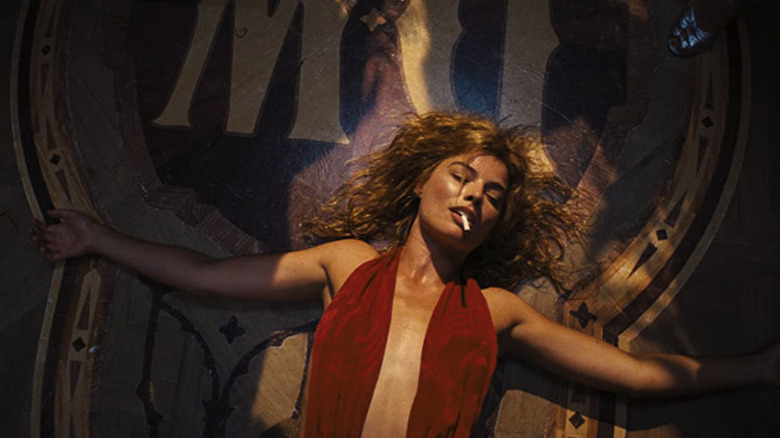Babylon Composer Justin Hurwitz On Crafting Controlled Cacophony [Exclusive Interview]
Damien Chazelle's "Babylon" is far and away the most ambitious movie of his career so far, and the same can be said about Justin Hurwitz's score. The composer, who has scored every one of Chazelle's films, had to create a larger-than-life sound that was able to keep up with the movie's relentless energy and breakneck pacing. Ostensibly full of 1920s jazz, the score actually incorporates more modern styles into its aural tapestry to help bridge the gap between then and now, underscoring how, despite what much of pop culture might have you believe, that period in history was not all glitz and glamor.
I had the opportunity to speak with Hurwitz over Zoom and talk to him about the musical links between the scores of "Babylon" and "La La Land," the last-minute addition of the movie's bravura final sequence, blending and twisting musical themes throughout the film, his lesser-known career as a comedy writer, and more.
Note: This interview has been lightly edited for clarity and brevity.
'We aim to definitely have the scores be one of a kind for the movie they're designed for'
I know you and Damien have a close collaboration, and Damien had been working on this project for years before it finally went into production. Were you also working on this for years, cooking up ideas and trying things out based on the drafts of the script that you saw?
So for me it was a little over a three-year process from when he gave me a draft of his script all the way through writing all that music and pre-production, being on set, and writing more score for about a year of post-production and mixing. I had no idea he had been thinking about this movie and researching it for 15 years. I had no idea this was in his head for so long. I only learned about it when he was writing the script. But yeah, for me it was about three years.
Have you ever created a piece of music for one of Damien's movies and then ended up actually using it in another movie?
We've had theme ideas that come to us where that I might play on the piano and be like, "How about this?" and it ends up not going in the movie, but then years later, either I'll be sitting at the piano noodling around and the same thing will come to me and I'll be like, "Oh, remember this idea from 10 years ago? We never used that. Maybe we could use that here." That's happened before. For the most part, it's good. I think we want all of our scores to belong just to the movie that they belong to. So "La La Land" ideas tend to just be for that movie, for "First Man" ideas, we wanted a "First Man" sound. So generally the ideas were just designed for that movie. And for "Babylon," hopefully there is the "Babylon" sound.
For the most part, we aim to definitely have the scores be one of a kind for the movie they're designed for. But there are definitely certain kinds of cues that might evoke certain feelings that we've used in other movies, where in the past we've been like, "Oh yeah, we never used that theme. That was a cool theme. It just didn't quite fit that movie, but maybe we could use it here." So every now and then a melody will resurface that we never used.
'Where we ended up was three pianos all blended together'
Along those same lines, I was listening to "Manny and Nellie's Theme," and to me it sounds almost like it could be a cousin to "City of Stars" from "La La Land," and I was curious if that was a conscious decision on your part, to create almost a a thematic precursor to another L.A. romance, or if that was just totally unintentional.
That's not an example of a tune that I'd had before that we thought, "Oh, how about we use that?" But you're totally right that the chord changes are similar and it evokes a certain bittersweet [vibe] that I think "City of Stars," for example, does. It's funny, where that came from, the first version of it, was not the "Manny and Nellie Theme," it was the more upbeat dance music on the baritone sax. That tune — ba-didi, didi, didi, do, do — it was was born in that form actually, in the dance form, and I was demoing it on virtual saxophone and then went searching for, who plays dance music on a saxophone? And learned about this incredible guy, Leo Pellegrino. There were these viral videos of him literally dancing while he plays his sax in the New York subway like 10 or 15 years ago, and now he's got this band, Too Many Zooz. So he's obviously the guy to record that baritone piece, all those pieces in the movie. So that was the first version of it.
Then as we were scoring the movie, as the movie was taking shape in post, we still needed a theme for Manny and Nellie and we discovered, if you slow down that theme and harmonize it, it ends up having the right bittersweet quality, a similar sort of harmonic world as "City of Stars," as you're pointing out. But then we had to go around and around on many ideas before we found the instrumentation of those Manny and Nellie cues. And where we ended up was three pianos all blended together. The first piano is just a beautiful mellow Steinway, just a grand piano, not too big and not too small, a midsize Steinway piano. The second piano is a spinet piano that has been treated with tacks on the hammers to give it this twang, and then the piano has also been detuned a little bit, so it's a little bit out of tune. Then the third piano is this very, very out of tune upright.
We found when we mixed all three pianos together, it had this sweet from the grand piano, it had the sour from the two out of tune pianos, and it had the right amount of sweet, the right amount of sour, and it had this fragile quality that felt like Manny and Nellie. We also started introducing some circus sounds into some of these cues. So some of the cues are really intimate and it's just the three pianos. Some of them have some snaps and some of them have some circus sounds in them because their relationship is also kind of a circus. But it took a long time before we found that instrumentation, and once we found it, it just felt like Manny and Nellie to us.
I like the idea that it originated as that sax thing and you figured out you could slow it down and find something new in it. It's almost like an aural Easter egg. Is that something that you try to do a lot in your scores? Taking a track that exists and manipulating it in some way to find a sub-theme or another theme for a different part of the movie?
Yeah, we're always trying to plant our themes early on and have them belong to things or people. Give them meaning. This is the tune that belongs to Nellie, "Voodoo Mama" becomes her theme. And you have the Manny and Nellie relationship theme. You have a Jack theme. You plant all these at that first party in this movie, and then we just keep calling them back and depending on what the later scenes need dramatically, we twist them, we disguise them, we slow them down, we speed them up, we put them in major or minor depending on what needs to happen. Sometimes they're so disguised that I think probably a viewer might not even realize that we're using something. But hopefully on a subconscious level, these themes have been imbued with meaning at this point, so hopefully they still affect you in some way.
But we love doing that. We've done that on all of our movies, really. And sometimes taking two themes and bringing them together. There's a track on the soundtrack called "Wild Child" on the soundtrack. It's during basically the "Nellie's career is taking off" montage, and the underpinning of it is a slowed down version of the "Voodoo Mama" sax riff — that's going on underneath it, and then over the top is some of the material from this other track called "Heyo" that we have later at the cafe that Manny and Nellie have their final dance at, at the end of the movie. So those two pieces of material are put in counterpoint, and we do that all the time. We'll take this theme, that theme, we'll put them together, we'll have them work in counterpoint. Obviously the finale track of "Babylon," it's like every melody in the entire movie put in counterpoint, which was its own challenge.
'For season 9, they brought me on as a proper writer-producer'
I was looking through your filmography in preparation for this, and I noticed that you have a bunch of credits as a writer, which caught me by surprise. I was totally unaware of that part of your career. I watched all of "Curb Your Enthusiasm" for the first time at the start of the pandemic. Can you tell me any stories about your experience on that show?
Yeah, so that's a really weird thing I've done. I wrote for a comedy magazine in college. And when I first moved out to L.A., I was waiting for Damien to make movies that I could score. We had been working on that "Guy and Madeline on a Park Bench," but it was really just a student film, so neither of us were making a living from it. So we were both doing other things to make our living. Damien was writing screenplays for other people, genre movies. And what I ended up falling into was, because I had written for a comedy magazine, I was contributing to some sitcoms. First, it was uncredited. I would just send joke ideas, because I had met some of the people who had written for the same magazine in college and were now writing for shows. So asking them, "Can I contribute?"
So I was sending off jokes and ideas and started off getting paid, but no credit on some of these shows. And then some of these TV sitcom producers were very nice and gave me the opportunity to actually co-write a script with them or contribute in a bigger way. So my first few years in L.A., that is what I was doing and that's how I was making my living before "Whiplash" got off the ground. Once Damien's movies — once there was a movie for me to score, that's all I wanted to do, because that's what I had studied. I had studied film scoring. It's what I wanted to do. It's, by far, what I'm most passionate about, what I'm better at than writing jokes and stuff. But writing for some sitcoms was definitely a fun and interesting way for me to keep myself busy until I could do music full-time.
But "Curb" specifically is famous having a structure, but there's a lot of improv within it. That seems different than just pitching a few jokes on a typical sitcom. "Curb" seems unique.
Well, I got in pitching story ideas, basically. Couple of sentences, few sentences, for a Larry story or a Susie story or whatever. I did that for one year. I did that for season 8. And then for season 9, they brought me on as a proper writer-producer where I got to really flesh out all the stories on the whiteboard with Larry and Jeff Schaffer. That just worked out perfectly, because the show was on hiatus for six years, and we made "Whiplash," we made "La La Land," and it was literally our last week on the dub stage of mixing "La La Land," and I got the call that "Curb" was coming back and they said, "Are you available?" and I was because there was a little window between "La La Land" and when I had to get going on "First Man," so I got to get involved in a bigger way.
I'd never really thought about this, but you just saying that a minute ago made me realize: People always ask me, the writing and the music, what are the similarities? And I always say, "There are none. They're just different sides of your brain. Music is its own thing." And I'm usually being very earnest and very emotional and serious about it. And then the writing on "Curb" and all that, it's just whenever something awkward happens in my life or I put my foot in my mouth or something, I have a dark idea, a cynical idea, that's an outlet for it. I'll just email them the idea and it's an outlet for it. So I usually say there is no connection. There're just totally different parts of your brain.
But you saying that actually made me realize that I guess there is a structural similarity in the way that "Curb" is written, the way that "Seinfeld" was written back in the day — same people — where the stories would all collide at the end. They would all come together in this very satisfying collision. And I guess we do that, our film scores do that. Everything comes together in the epilogue of "La La Land." All of our themes come together in the landing of "First Man." All of our themes come together in the finale of "Babylon." Very different techniques to how we bring it together in each of those film scores, but everything does collide in the end. And I've never really thought about this, but I suppose the things I've written for in a very different way, narratively with comedy storylines, they all kind of collide. So maybe deep down there is some kinship between those things.
'It was a really, really fun challenge'
You mentioned everything colliding in the finale of "Babylon." I read somewhere that you said that was a late addition to the script and Damien came to you and said like, "Hey, by the way, I need five or six more minutes of music." What was your initial reaction to hearing that? Because that's obviously a very key part of the movie where everything has to come together, so I imagine there's a lot of pressure for you as a composer to come up with something that underpins all of that. What was going through your mind?
Yeah. Well, you said late addition to the script — it actually wasn't even in the script. It was at the very end of making the movie. It was actually as we were right about to mix the movie, I was mixing the score — I'd been mixing the score for months — and the final dub was about to get going. That's where you mix the final, final movie: The music against the dialogue against the sound effects. And like a day before we were supposed to start that, Damien was like, "Hold on, I have a new idea for the end of the movie." And he and Tom Cross, the editor, were just working on it, they cut it, they were kind of hunkered down doing their thing. And I was so excited to see what is this ending going to be? And once I saw it, I saw what it was, and that it would need a lot more music, and I knew it would take a lot. We had to basically pause for another month so I could put that whole music together.
So I knew it would be a lot of work and I knew we'd have to pause the process for me to do it. But I was also very excited, because I thought it was a great opportunity to land the score in a way that we could bring everything back all at once, and have so much fun with putting everything in a blender, and having every single melody, every single theme from the movie, come back all at the same time. It's like I said, it's similar in a way to what we did in "La La Land," but a very, very different technique. In "La La Land," in the epilogue, all the melodies come back, but they're arranged to elegantly flow from one to the next. Here, they're all happening at the same time.
So to construct something that was cacophony, but also still very thoughtful in how things were placed, so they'd each have their moment. They're all kind of going on at the same time, but you give them, through how I placed them and through how we mixed them, this melody pops up over here, and using the stereo spread of it, this thing pops up on the left, this thing pops up on the right, this thing pops up in the distance because we've given it a lot of reverb, and they're all swirling around and getting their own moment. And we have not one, but two crazy drum solos going on, left and right. Peter Erskine and Gary Novak, and they're both going crazy, but we're giving them each their moment to pop up and a crash here and a crash there, and a Peter crash and a Gary crash. To build this whole basically assault of music, but where everything is still very thoughtful in how it's placed so that we are toeing that line between cacophony, but also something that's crafted.
It was a really, really fun challenge, and just such a satisfying way for me to be able to take such a sprawling — it's a sprawling movie and it's a sprawling film score, and there's so many themes and so many styles of music in the movie. To bring them all back and have them all land at the same time was a really, really fun challenge.
"Babylon" is currently available on Digital, and arrives on 4K, Blu-ray, and DVD on March 21, 2023.




